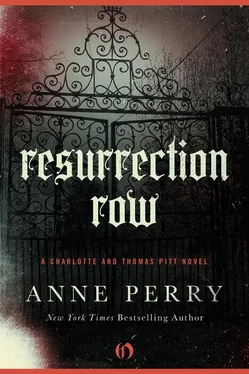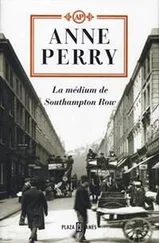Anne Perry - Resurrection Row
Здесь есть возможность читать онлайн «Anne Perry - Resurrection Row» весь текст электронной книги совершенно бесплатно (целиком полную версию без сокращений). В некоторых случаях можно слушать аудио, скачать через торрент в формате fb2 и присутствует краткое содержание. Жанр: Исторический детектив, на английском языке. Описание произведения, (предисловие) а так же отзывы посетителей доступны на портале библиотеки ЛибКат.
- Название:Resurrection Row
- Автор:
- Жанр:
- Год:неизвестен
- ISBN:нет данных
- Рейтинг книги:5 / 5. Голосов: 1
-
Избранное:Добавить в избранное
- Отзывы:
-
Ваша оценка:
- 100
- 1
- 2
- 3
- 4
- 5
Resurrection Row: краткое содержание, описание и аннотация
Предлагаем к чтению аннотацию, описание, краткое содержание или предисловие (зависит от того, что написал сам автор книги «Resurrection Row»). Если вы не нашли необходимую информацию о книге — напишите в комментариях, мы постараемся отыскать её.
Resurrection Row — читать онлайн бесплатно полную книгу (весь текст) целиком
Ниже представлен текст книги, разбитый по страницам. Система сохранения места последней прочитанной страницы, позволяет с удобством читать онлайн бесплатно книгу «Resurrection Row», без необходимости каждый раз заново искать на чём Вы остановились. Поставьте закладку, и сможете в любой момент перейти на страницу, на которой закончили чтение.
Интервал:
Закладка:
He was still considering the matter, with the letter in his top drawer, when Alicia came, wrapped in furs to her throat. She caused a few surprised comments in the outer office, and the constable who preceded her to tell Pitt had eyes as round and bulbous as marbles.
“Good morning, ma’am.” Pitt offered her the chair and waved the constable away. “I’m afraid I have nothing new to tell you, or I should have called to say so.”
“No.” She looked everywhere but at Pitt. He wondered whether she was simply avoiding him, or if she had any interest at all in the brownish walls and the austere prints on them, the boxes bulging with files. He waited, leaving her to find her own courage.
At last she looked at him. “Mr. Pitt, I have come to ask you not to continue with the matter of my husband’s grave being disinterred-” That was a ridiculous euphemism, and she realized it, stammering a little awkwardly. “I–I mean-the digging up of his body. I have come to the belief that it was someone deranged, vandals who knew no better. You will never catch them, and no good can be served by pursuing it.”
A sudden idea occurred to him. “No, I may not catch him,” he agreed slowly. “But if I do not pursue it, then there may be great distress, not least to you yourself.” He met her eyes squarely, and she was unable to look away without obviously avoiding him.
“I don’t understand you.” She shook her head a little. “We shall bury him and if necessary hire a servant to keep guard for as long as need be. I see no way in which that can cause distress.”
“It may well be that it was merely a lunatic.” He leaned a little forward. “But I’m afraid not everyone will believe so.”
Her face pinched. He did not need to use the word “murder.”
“They will have to think as they choose.” She lifted her head and gripped her fur tighter.
“They will,” Pitt agreed. “And some of them will choose to think you have refused to allow a postmortem precisely because there is something to hide.”
Her face paled, and she knotted her fingers unconsciously in the thick pelts.
“Unkindness is surprisingly perceptive,” he continued. “There will be those who have remarked Mr. Corde’s admiration for you, and no doubt those also who have envied it.” He waited a moment or two, allowing her to digest the thought, with all its implications. He was preparing to add that there would be suspicion, but it was not necessary.
“You mean they will wonder if he was murdered?” she said very softly, her voice dry. “And they will say it was Dominic, or me myself?”
“It is possible.” Now that he had come to it again, it was hard to say. He wished he could disbelieve it himself, but remembering Dominic and sitting here looking at her face, eyes hot and miserable, hands twisting at her collar, he knew that she was not sure beyond question even in her own heart.
“They are wrong!” she said fiercely. “I have done nothing to harm Augustus, ever, and I am sure Dominic-Mr. Corde-has not, either!”
It was the protest of fear, to convince herself, and he recognized it. He had heard just that tone so often before when the first doubt thrusts itself into the mind.
“Then would it not be better to allow a postmortem?” he said softly. “And prove that the death was natural? Then no one would consider the matter any further, except as an ordinary tragedy.”
He watched as the fears chased each other across her face: first a catching at the hope he held out; then doubt; then the sick pain that it might prove the exact opposite and make murder unarguable, a fact.
“Do you think Mr. Corde might have killed your husband?” he said brutally.
She glared at him with real anger. “No, of course I don’t!”
“Then let us prove that it was a natural death with a postmortem, which will put it beyond doubt.”
She hesitated, still weighing the public scandal against the private fears. She made a last attempt. “His mother would not permit it.”
“On the contrary.” He could afford to be a little gentler now. “She has written to request it. Perhaps she wishes these voices silenced as much as anyone else.”
Alicia pulled a face of derision. She knew as well as Pitt, who had read the letter, what the old lady wanted. And she also knew what the old lady would say, and go on saying until the day she died, if there were no postmortem. It was the deciding factor, as Pitt had intended it should be.
“Very well,” she agreed. “You may add my name to the request and take it to whoever it is who decides such things.”
“Thank you, ma’am,” he said soberly. The victory had no pleasure in it. He had seldom fought so hard for something that tasted so bitter.
The postmortem was a gruesome performance. They were never pleasant, but this one, performed on a body that had now been dead for nearly a month, was grimmer than most.
Pitt attended because in the circumstances it was expected that someone from the police be there, and he wanted to know for himself each answer the minute it was obtained. It was a day when the cold seemed to darken everything, and the autopsy room was as bleak and impersonal as a mass grave. God knew how many dead had passed across its scrubbed table.
The pathologist wore a mask, and Pitt was glad of one, too. The smell caught at the stomach. They worked for hours, calmly and in silence but for brief instructions as organs were removed and handed over, samples taken to search for poisons. The heart was looked at with particular care.
At the end Pitt walked out, numb with cold, his stomach tight from nausea. He huddled his jacket round him and pulled his muffler up to his ears.
“Well?” he asked.
“Nothing,” the pathologist replied dourly. “He died of heart failure.”
Pitt stood silently. Half of him had wanted that answer, and yet the other half could not believe it, could see no sense in it.
“Don’t know what brought it on,” the pathologist went on. “Heart’s not in a bad condition, for a man of his age. Bit fatty, arteries thickening a little, but not enough to kill him.”
Pitt was obliged to ask. “Could it have been poison?”
“Could have,” the pathologist answered. “Quite a lot of digitalis there, but his doctor says the old lady had it for her heart. He could have taken it himself. Doesn’t look like enough to have done him any harm-but I can’t say for certain. People don’t all react the same way, and he’s been dead awhile now.”
“So he could have died of digitalis poisoning?”
“Possibly,” the pathologist agreed. “But not likely. Sorry I can’t be more help, but there just isn’t anything definite.”
Pitt had to be content. The man was professional and had done his job. The postmortem had proved nothing, except confirm to the world that the police were suspicious.
Pitt dreaded having to tell the news to his superiors. He treated himself to a hansom from the hospital back to the police station and got out in the rain at the other end. He ran up the steps two at a time and dived into the shelter of the entrance. He shook himself, scattering water all over the floor, then went in.
Before he reached the far side of the room and went up the stairs to break the news, he was confronted by the red face of a young sergeant.
“Mr. Pitt, sir!”
Pitt stopped, irritated; he wanted to get this over as soon as possible. “What is it?” he demanded.
The sergeant took a deep breath. “There’s another grave, sir-I mean another open one-sir.”
Pitt stood stock-still. “Another grave?” he said fatuously.
“Yes, sir-robbed, like the last one. Coffin-but no corpse.”
“And whose is it?”
“A Mr. W. W. Porteous, sir. William Wilberforce Porteous, to be exact.”
Читать дальшеИнтервал:
Закладка:
Похожие книги на «Resurrection Row»
Представляем Вашему вниманию похожие книги на «Resurrection Row» списком для выбора. Мы отобрали схожую по названию и смыслу литературу в надежде предоставить читателям больше вариантов отыскать новые, интересные, ещё непрочитанные произведения.
Обсуждение, отзывы о книге «Resurrection Row» и просто собственные мнения читателей. Оставьте ваши комментарии, напишите, что Вы думаете о произведении, его смысле или главных героях. Укажите что конкретно понравилось, а что нет, и почему Вы так считаете.












